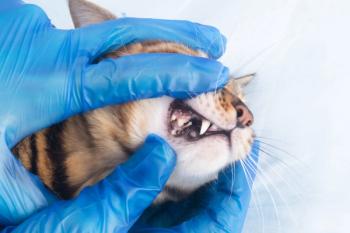
Journal Scan: Are feline struvite urolith dissolution diets a good first-line therapy?
A study evaluates the efficacy of two commercially available low-magnesium, urine-acidifying diets for the dissolution of sterile struvite uroliths in cats.
Why they did it
Despite the availability of calculoytic diets that effectively promote struvite dissolution in cats, struvite urolithiasis continues to be a concern in our feline patients. The authors of this study evaluated the efficacy of two commercially available low-magnesium, urine-acidifying diets for the dissolution of sterile struvite uroliths in cats.
What they did
Between April 2009 and January 2011, researchers enrolled 37 client-owned cats with presumed struvite urolithiasis. All cats underwent weekly physical examinations, urinalyses, and abdominal radiographic examinations throughout the study period. Cats with uroliths in areas other than the bladder, evidence of systemic disease, or a recent history of medications or nutritional supplements were excluded from the study. Cats were randomly assigned to be fed one of the two diets:
• Food A, a diet specifically intended for struvite dissolution and formulated to achieve a urine pH of 5.9 to 6.2
• Food B, a maintenance diet intended for dissolution and prevention of struvite uroliths and formulated to achieve a pH of 6.2 to 6.4.
What they found
About 86% of cats (32/37) had complete dissolution of their uroliths, and in the five cats with no dissolution, uroliths were subsequently found to be 100% ammonium urate (n=4) or calcium oxalate (n=1). For cats fed food A, the mean time to a 50% reduction is urolith size was roughly five days, with complete dissolution noted at a mean of 13 days. These values were about 12 days and 27 days for cats fed food B. None of the cats developed urethral obstruction during the study period, but the authors note that 78% of the enrolled cats were female and, thus, perhaps at decreased risk for this complication. No diet-related adverse effects were noted.
Take-home message
Nutritional management should be considered in cats with sterile struvite urolithiasis before more invasive extraction measures are used. Both diets in this study resulted in complete dissolution of the struvite uroliths, but success will depend on the accurate prediction of urolith composition based on shape and radiopacity. It is important to note that while the presence of struvite crystals and urine pH can be helpful in predicting composition, only 19% and 40.6% of the cats in this study had struvite crystalluria and a urine pH > 6.5, respectively.
Lullich JP, Kruger JM, MacLeay, et al. Efficacy of two commercially available, low-magnesium, urine-acidifying diet dry foods for the dissolution of struvite uroliths in cats. J Am Vet Med Assoc 2013;243(8):1147-1153.
Link to article:
Jennifer L. Garcia, DVM, DACVIM, is a veterinary internal medicine specialist at Sugarland Veterinary Specialists in Houston, Texas.
Newsletter
From exam room tips to practice management insights, get trusted veterinary news delivered straight to your inbox—subscribe to dvm360.



